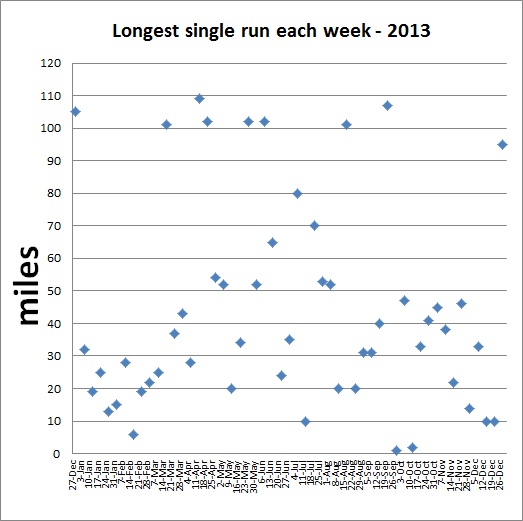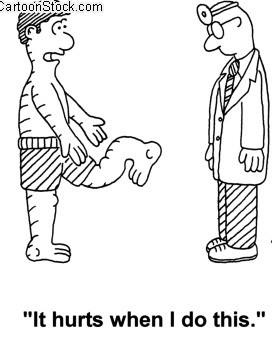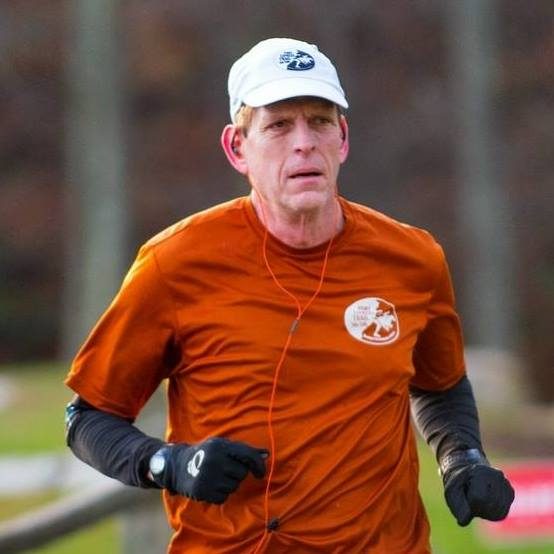
In my early years of ultrarunning, at times well-meaning friends would confront me to let me know that they thought I could be ruining my life and the lives of others by participating in, and encouraging ultrarunning. As of 2014, after nearly ten years in sport, my family and friends know now this is part of my life and it seems like concerns have decreased because my happy life goes on. But all new runners in the sport will probably be confronted by similar concerns. I don’t claim to be a doctor or family therapist of any kind, but I can offer opinions that comes through my experience after nearly ten years of ultrarunning.
Some typical beliefs are:
1. That because low-mileage runners get injured, surely a high-mileage ultrarunner is seriously damaging their body far more.
2. That some exercise is of course good, but the level of exercise an ultrarunner participates in not normal and therefore unhealthy.
3. That ultrarunners are neglecting their families and are being selfish.
Let me deal with each concern:
Concern #1: Because low-mileage recreational runners get injured, surely a high-mileage ultrarunner is seriously damaging their body far more.
I believe that ultrarunners are far less-susceptible to injury than what I’ll call a “recreational runner.” This is someone who may run now and then and perhaps gets serious enough about it to run a marathon. When I was a recreational runner (and a poor one), I was always getting injured or sick, and it would make me quit running. I then became a couch potato, gained weight and continued with poor health. I see these types of runners always battling injuries. I constantly advise runners how to recover from injuries.

There is one huge difference in the running I do. I generally avoid roads like the plague. Most of the time, I only run roads during a road race (5k, 10k, etc.) or during the winter when the trails are muddy. This makes a huge difference on the wear and tear of an ultrarunner’s body. I do believe that high-mileage on roads can be damaging to the body over time because of the jarring caused on joints and bones. Running on soft trails are a world of difference.
I also believe that once ultrarunners have established a high mileage base (and frequently they do go through injury to reach this) that their body has gone through some amazing adjustments that now prevent injuries that are typical with a recreational runner. I’m always asked, “Aren’t you ruining your knees?’ No. My knees now are stronger, the ligaments and sinews tighter, such that they can endure great distances without problem. I don’t get common running injuries like ITBS or runner’s knee problems anymore. People just can’t understand the wonder of the human body, that it can do amazing things to adjust once it has become used to the stress. It puts up new barriers to protect itself from that stress.
Many people don’t have an understanding of the fast recovery ultrarunners experience once they have a high-mileage base. After my first 100-mile race, I could hardly walk for a week, and couldn’t run for a month. I also experienced some soft-tissue damage in my knee. But I didn’t have that high-mileage base to protect me. Now I do. I can run a 4-hour marathon and feel no pain the next day. I can run a 50-mile race, and be out running pain-free in three days.

In 2013 I experimented with doing very long runs each week instead of running every day. I discovered that my body adjusted and could start recovering faster than it ever had before. I was even able to run two 100-milers with only five days rest between them. I performed well in both, each under 24 hours. But this is hard to understand if you haven’t experienced it. If a recreational runner feels pain for a month after a marathon, surely ultrarunners must feel several months of pain after a 100-milers. The logic doesn’t hold.

Does this mean that I don’t get injured? Yes I do, especially because in 2014 I am turning 56 years old. Here are some of my chronic injuries that I deal with.
1. I have some numbness in my feet — the ball of my feet extending to a couple toes. It is minor and I don’t really notice it much anymore. After long races it will be more pronounced, but then it mostly goes away. I don’t see this as a problem.
2. I have a neuroma in the ball of my right foot. This is a bunching of nerves that can cause severe pain extending out to your toes. Anyone can get this, even non-runners. I just deal with it. Good shoes help. Using a thinner insole helps. During a race it can flare up for about ten miles and really hurt, but then it calms down.
3. I tore the meniscus in my right knee when I was an over-weight backpacker. So, I have less cartilage protection in that knee. I can feel pain there at times, but I have learned to manage it and the knee has become stronger and now protects itself. I feel far less pain in it than years ago. I feel less pain if I consistently run. Nine years after my knee surgery, I went back to my orthopedic surgeon to have him check the knee again. An MRI showed no new damage at all. When I told that doctor that I had run 24,000 miles on that repaired knee, he started bragging to all his office staff.
4. About once a year I bruise my bladder, usually due to running dehydrated. The result is soreness in the abdomen and hematuria (blood). This can be alarming, but a running doctor understands what is going on. I let it heal and am more careful about hydration.
5. I get sesamoiditis in my feet. There are two little bones in the ball of the foot behind the big toe named sesamoids. These have become irritated over time and get inflamed. They are not fractured, but the surrounding tissue has grown more, in an attempt to protect them. The cause is pretty simple – shoes too narrow. Wider shoes solve the problem for me. Large toe boxes like the Altra shoes have worked great.
6. I have some cool scars on my arms and legs from face-plants on the trail. Big deal, at age 55 I’m not entering beauty contests anymore. To prevent this, I like running with hand-held running bottles. When I fall, the bottles take the brunt of the damage.
7. I have Peroneal Tendonitis in my left ankle. This was caused by a badly rolled ankle and is a common runner injury. I’ve learned to manage it and protect the tendon from further stress.
8. I have a hamstring pull that flairs up. I injured it running a silly 5K too fast for my age, not in a 100-miler

9. In 2012 I experienced my most serious injury, a stress fracture in my tibia. This was caused by running in old shoes that caused my right foot to turn in too much. Rather than let it heal, I aggravated it more and then couldn’t run for six months. I learned a lot about bones and taking the time to heal.
10. OK I did break my hand while running a 100-miler, but it was a freak accident. I was running down a slick grassy slope and my feet flew out in front of me. I put my hand down on the grass and a sharp rock hit it in just the right place. I continued on and did finish that race. The X-ray technician was skeptical about my story. The break looked like I punched someone or something.
So that is it. Nothing terrible besides the problem leg bone. No ITBS problems, no planter fasciitis, no serious muscle problems, and no back problems.
Articles pop up every year about some study that concludes that ultrarunning is unhealthy. Here is a recent article. Some have posted this article as proof that ultrarunning is unhealthy. But if you read closely, you understand that yes, we probably have more allergy problems than others (well, we are in the outdoors a ton more), and have more asthma. But: “ultramarathon runners appear healthier and report fewer missed work or school days due to illness or injury.”
When I have health checkups, all is OK. My cholesterol level is great because of the super high level of HDL caused by good fitness. Nurses who draw my blood always comment on the wonderful deep red color due to high oxygen content. When I had an EKG the technician commented on my strong heart and said, “you must be a runner.” My resting heart rate is about 50. Yes, I have hay fever and sinus problems, but I have had that all my life.
I haven’t addressed nutrition. While my nutrition has improved, I’m not a shining example in this space and could do better.
Concern #2: Some exercise is of course good, but the level of exercise an ultrarunner participates in not normal and therefore unhealthy.

Recreational runners for some reason believe there is a wall at 26.2 miles and that anything over that is not normal. What is so magic about 26.2 miles? Yes runners constantly complain about “hitting the wall” before that distance. They therefore think it is a barrier, and anyone going past that is not normal and doing something amazing or unhealthy. All of this is pretty silly and is mostly just a misunderstanding of how to fuel properly and get the balance in your body to prevent the crash into the “wall.” In most of these cases, their body hasn’t yet adjusted to the stress of high mileage. Just because they haven’t experienced the lack of pain and stress at long distances, doesn’t mean it isn’t possible, even for them.
I probably exercise on average about 8-12 hours per week. Is that excessive? Because I now have a high-mileage base and my body has adapted in amazing ways, I can be dormant for days and then just jump right back into the saddle with no problem for even higher performance. I’m not exercising huge amounts each week. Yes if I was young and wanted to be an elite ultrarunner, winning races, I would need to do much more. But, as of 2014, I’m 55 years old. It is not going to happen. I’m happy with strong performance in races and a fitness level so I can do them often.
I don’t follow ridged training programs that prescribe how many miles you “must” run each day to prepare for a race. I watch out for overtraining and have learned to detect the signs of fatigue. If I need to rest, I will skip days.

With the amount of exercise I do, I know far more about my body. I understand the signals it sends me when there is something wrong. I believe strongly that if I develop a serious illness, that I will detect it far faster than when I was a couch potato. I know my body now. I didn’t before. I believe my life will be extended for years more because of ultrarunning if I’m lucky enough to avoid accident and disease. As a couch potato, or even as an occasional recreational runner, I didn’t have this knowledge or fitness to protect my body.
Concern #3: Ultrarunners are neglecting their families and being selfish.

This is a danger. Yes, many ultrarunners neglect their families. I especially worry about younger runners who have busy families with young children. I hope they aren’t missing out on experiences with their families that they will later regret.
I took up ultrarunning in my mid-40s as my children were leaving the nest. I try to be careful with my time. I sleep about 7 hours on average per night. Once I became fit, I discovered that my sleeping needs decreased. My wife sleeps about nine hours on average per night. My remaining teenager at home seems to sleep 12 hours a day. Therefore, there is on average at least 2 hours per day when I’m awake and the rest of the family is asleep. I try to do almost all of my training during those hours. Where is the harm to the family? Yes, for races I’m away, but I try to get my family to go with me at times and when I add up the days, I’m away from home far, far, less than others who have demanding jobs that take them away from home. My wife isn’t a runner. We negotiate on time. I try to listen and be a good husband and father. We have a very happy family life.
Most people think that in order to run 100 miles, you need to run every day. Not so. Taking a look at my 2010 running history, I ran about 3,400 miles that year, but only ran on average 3.5 days per week. I never train on Sundays and I believe firmly that a day of rest every week helps a ton. In 2013, when I concentrated on running very long single runs each week, I ran a total of 3,200 miles, but on average only 2.5 days per week.

Some argue that ultrarunning is a very selfish use of time. I don’t buy this at all. I am also a musician and used to spend hours each week practicing. How is this talent less selfish? I can share that talent by playing for others. I make sure my ultrarunning experience is not selfish by writing about my experiences and sharing them with others. This is very fulfilling. I’m hopeful that my writings have affected many other people who have been inspired to improve their lives with better fitness or set greater heights in their goals. Its not just about me, its more about others.
From a good friend: “I’ve been reading this blog for years. Davy’s ‘selfish’ ultrarunning has dramatically changed my life. In August 2008 I was diagnosed with Type 2 Diabetes, complete with all the side effects, blurring vision, urinary problems, circulation problems and more. I was overweight and it hurt to stand up and walk.” This friend started walking and then ran. Eventually he could run a 50K. He continued, “Six months from truly poor health to being able to run 32 miles. This insane and crazy sport has freed me. Down over 40 pounds, blood sugar is normal, side effects are gone. Thanks for being selfish Davy.”
From another reader, “I know a lot of us ultrarunners get the same questions from friends and family with a concerning tone. I first tried to explain to them how great it felt to push my limits and open up doors within myself I never knew existed, but soon realized I was not closing the gap with their understanding. Nevertheless, a few do understand and helped crew which resulted in them getting a peek into what is possible. Some have even started to live healthier and exercise after hearing about my experience, although they have no plans to go the distances we do. I warn them that the only limit is in their head!”
Lastly, I would like to put in a plug for the Pony Express Trail 50 and 100. I purposely designed the format of the race so it could be shared by family and friends. A crew is required to follow along to provide support and watch their runner perform. Yes, I could change the format of the race to include aid stations and eliminate the need for crews, but I won’t as long as I’m the race director. The reason is because I have personally witnessed miracles happen between these runners and their crews. I’ve seen sons who come out grumbling about having to crew their dad, but by the end of the race the son is so excited that he’s talking about running the race next year. I’ve seen the tears of joy at the finish line, not just from the runners, but from the crews too who watched the highs and lows of the entire experience. If you want to truly share the ultrarunning experience with your family and friends, consider Pony Express Trail 50 and 100.
Conclusion
I’m comfortable with being an ultrarunner. I know the general population thinks it is crazy because their conclusions are from their own experience and prospective. They don’t understand the facts. My health has greatly improved and I’ve had amazing experiences in the outdoors that most people will never experience. But with all of this, life balance is the key. Running isn’t my entire life. I have a wife, six children, and as of 2014, four grandchildren. I enjoy spending time with them. I still have a busy career, and serve many hours in my church. I have other hobbies, including family history research, authoring books, and watching sports. With anything, life balance is important.


Hi Davey:
Very nice blog. I just read about your Ultrarunning and Life Balance. I am new to the sport, last year I ran 2 50 milers and jumped right in to the 100 miler challenge, I’ll be doing my 100 miler May 24th at Sulfur Springs in Anchaster Ontario Canada, and then another in September in Haliburton Ontario Canada. I am 61 years young. I agree on all points you make.
I will be putting your blog on my desktop so I can read other parts of this another time.
Happy Trails
Al